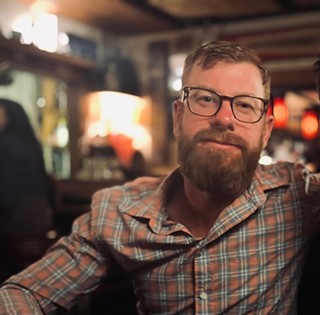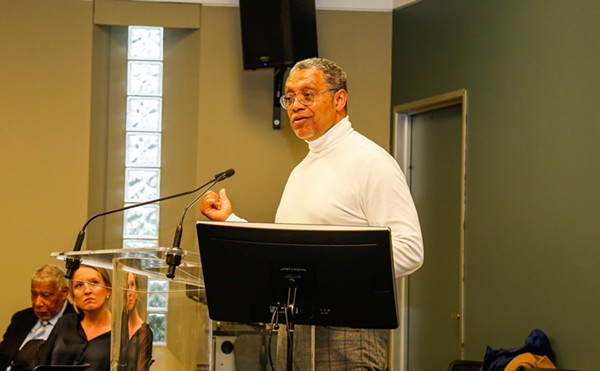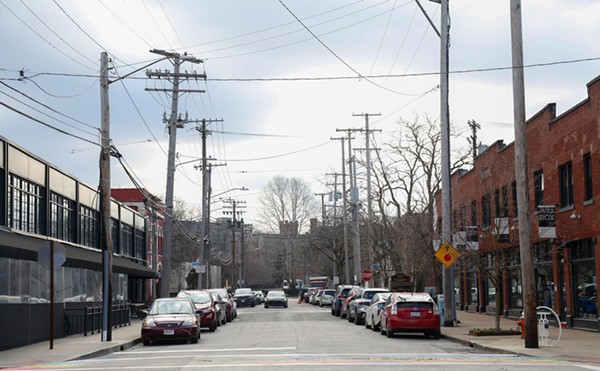Shortly after Crouch reached out to the ATF, her mother began noticing cars parked outside of the house. She took the kids and left for Florida, hoping to escape the violence Crouch had brought into their lives. She didn't know what her husband had gotten into.
"They found us, though," says Taylor. "And they told my mother that our lives were in danger and we had to go into witness protection. And the Feds actually told her, if you don't stay with your husband we won't put you in the program and you will be killed."
The family was brought back to Cleveland and whisked away in a series of black vans to a safe house back in Florida, eventually landing in Billings, Mont. Taylor was barely 8 years old, unable to say goodbye to friends. She remembers sitting in her room and writing her new name over and over again in a notebook, practicing. Jackee Taylor. Jackee Taylor. Jackee Taylor. Jackee Taylor.
Crouch would drop in for a few brief stints in Montana, but he never stayed long and eventually her mother told the children he was going on a ship and would not be able to talk to them. He was actually in prison.
"He'd write us kids every once in awhile, and there were phone calls every couple of months," she says. But her mother began telling them the truth about their father—the killings, the crime—and Taylor's perceptions of her father changed. "I guess she wanted us to feel like she did. We had talked about him lovingly."
Her mother filed for divorce. When Crouch got out of prison, he sent them each a letter with a $20 bill asking to stay in touch.
"I knew that we were in witness protection and couldn't tell anyone," says Taylor. "For years, I was scared every time I heard the sound of a motorcycle. I would fall to my knees and start shaking."
Later, she would learn, she had nothing to fear in terms of retribution. She returned to Ohio for her uncle's 50th birthday party. Her aunt had invited just about everyone in their address book, which included a couple of Hells Angels, who actually showed up.
"I froze when I saw them," says Taylor. "I was standing with my grandfather and he told me not to say anything. But one of them came over—he remembered me—and asked how my mother was doing. I said she was good. He said, 'Good. Tell her she has nothing to worry about. You have nothing to worry about. It was always between us and your dad.'"
It turns out Taylor's life would not be the challenge of evading the Hells Angels (though plenty of other troubles dotted her new world, including violence at the hands of her mother and drugs by the age of 18, though she would get clean); it would be a challenge to reclaim anything close to a normal existence because of problems with witness protection.
"I don't have a birth certificate," says Taylor. "I've called and wrote everyone I can, but never get a response. My mom had to beg to let me play sports because they always wanted a birth certificate and I didn't have one."
Crouch may have been landing cash for his role, but that money never made its way to her family, she says. "It's not like in the movies and TV," Taylor says. "It's glorified. There's no cash and a new car. People think that's how it is. I couldn't get a marriage license if I wanted to, I can't get certain jobs, we are bottom-rung feeders. When you're a kid, you don't sign up for this."
Taylor went public in 2010, describing her story and her problems with witness protection to the Billings Gazette. "Nobody seems to be on our case anymore," she said at the time. "It seems like we've fallen through the cracks. I want a passport. I want a birth certificate. I want to be able to go to Mexico on vacation. I want to be able to get my marriage license in Yellowstone County. It's just been nothing but problems."
Three years later, she still does not have her birth certificate.
***
In addition to diming on his former friends in 1981, Crouch told ATF agents that he was responsible for a 1974 shooting death in Akron. "This crime remained unsolved until the Defendant confessed to federal agents on November 5, 1981," reads the negotiated plea deal Crouch reached with prosecutors. He would be sentenced to 10 to 40 years and serve eight.
The list of cases Crouch gave information on is extensive. The Cleveland police intelligence report rattles off the names—The Pircio bombing, the John Del Zappo bombing, the Thomas Norton bombing, Bruce Sunday homicide, Denise Padavick homicide, the Richard Spears homicide and on.
Crouch was the state's star witness in three trials in the 1980s, though he wasn't quite the star that prosecutors had hoped for—a known criminal, drug user, drug dealer and killer, and none resulted in convictions.
Cross examination from the defense usually followed along the same topics. Yes, he shot a girlfriend in the leg, Crouch said. Yes, he stabbed another in the foot. Yes, he took a plea deal. "I'll take what they give me, I'll stand for what I did," he said. Yes, he was paid $1,245 a month for being a protected witness.
One of the cases Crouch testified in was against Richard Amato, who was arrested for the Sigley bombing. Crouch claimed Amato thought he was targeting an Outlaw member. Later, in emails and writings, Crouch would say that Hells Angel Harold Chakirelis was also responsible. It had been Harry's birthday that night, and before the cake could be eaten, Crouch says they realized Harry hadn't "rolled his bones" yet. Which led Amato and Harry to exit the clubhouse on Edna Avenue and Harry allegedly saying he'd have his bones "before the cake goes stale."
Judge James McGettrick dismissed the charges, however, he would later be arrested for accepting a bribe from the Hells Angels in the case. (How that came about: An undercover ATF quipped to McGettrick at a bar, "We really appreciate what you did for us." The judge thought the guy was a friend of the Hells Angels and responded that he should have gotten a bigger bribe. He was later caught accepting a bribe to fix the murder case against Frank Fencl, another Cleveland Hells Angel member.) Amato was never retried.
Between inconsistencies in his testimony, his reputation, and cases that often hinged on nothing but Crouch's word, he became the witness no one wanted.
Crouch was never even brought to the stand by Summit County prosecutors in a murder case against Hells Angel Cleveland member Andrew Shission.
For all his information, Crouch's actions proved to have very little effect in putting anyone in jail in Cleveland. By 1990, he was out of jail himself on the plea-bargained manslaughter charges and living down south.
Attempts to contact Hells Angels from Crouch's era were unsuccessful. Many of them are now deceased.
Divorced and out of contact, by choice and circumstance, with his children, Crouch moved to Georgia from 1990 to 1992 living as Paul Allen Verns before moving to Virginia until 1993 as Paul Allen Dome—he'd been in some sort of bar fight and the arrest precipitated the name change. He bounced around Arkansas and Louisiana some before happening upon Vivian Greer who had been looking for someone to work on her house in exchange for room and board. He'd left the witness protection program, content to create security and a new life for himself.
The two married shortly thereafter and returned to eastern Texas, Crouch's old stomping grounds. They settled in Avinger, buying the RV community, a bait shop and the liquor store, which they eventually sold to a family friend.
***
In April 2006, Jackee Taylor traveled to Louisiana to visit with Crouch's sister. She implored Taylor to visit Crouch in nearby Texas. It would be good, she said. It would be healing.
She had not seen her father since he left for prison in the early 1980s. Her siblings had not been in touch with him, though she occasionally exchanged letters, the only one from the family to do so. (During one trial, a defense attorney claimed Crouch had bragged about having 13 illegitimate children. Taylor says he once told her sister that the number was actually probably in the 20s.)
"It was nice," Taylor says. "We talked, we barbecued—he was a big outdoorsman and liked fishing and hunting and, of course, smoking his weed—and I got to let go a lot of the hate that I had. I got to see he was a normal guy trying to make a decent living. I called him Pop, not Dad. It was weird to call him Dad after all that time."













